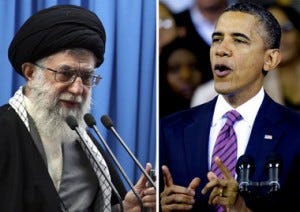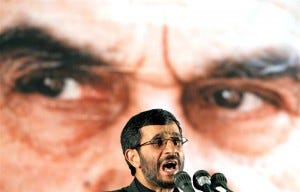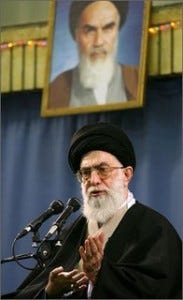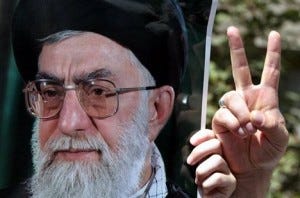Israel-Iran war: When will Israel attack Iran? When will America? (2012 Predictions)
Will an Iran war with Israel and/or America happen in 2012 before the U.S. presidential elections or after? When will Israel attack Iran? What is the key factor that could change Obama's timing that no one is thinking about ... except maybe Obama.

Establishing the time perimeter for an Iran War
Almost everyone accepts that Israel would have already attacked Iran if not for intense U.S. persuasion not to. Israel has expressed zero belief in the likelihood of sanctions and talks to accomplish anything. It clearly strains Prime Minister Netanyahu's patience to the limit to abide these talks, but he is waiting. So, I take it as a given for most people that willingness on the part of Israel to attack Iran has already been established, if not for other constraints. In other words, the inside (earliest) time for an Israeli attack on Iran is already past. The next question, which is harder, is "What is the outside (latest) time when Israel will attack Iran?"
The constraints are pretty well known by all, but I'll list them for the sake of being thorough: Israel does not wish to anger its American ally on such a major economic issue. Israel does not wish to enrage the rest of the world with an Iran war that would likely make everyone's economic problems worse. No one wants to be seen as the cause of the next perilous dip in the Great Recession.
But those concerns don't outweigh Israel's sense of national security. Neither Israel's prime minister nor its minister of defense feel Israel has any more time to wait. Both have said that Iran will have its nuclear material too deep for Israel to reach by August. Thus, our own secretary of defense felt they would attack by June, rather than wait to the last minute.
That is where President Obama has done a masterful job of holding Israel at bay for now by taking realistic measures. In 2012 he finally made it clear to Israel and the world that the U.S. would do the work of disarming Iran if necessary as we are capable of going much deeper. Until this year, that much was not even certain. Then, as that would require Israel to rely too much on trust in us, Obama delivered more powerful bunker-busting bombs to Israel. Waiting for those bombs to arrive, meant Israel could increase its chances of effectiveness and have time to build up its anti-missile protections internally.
So, long as Israel and America are sure that Iran does not have nuclear weapons and that both nations have bombs capable of getting at Iran's nuclear materials, both will be willing to avoid an Iran war a little longer. But the clock is ticking a lot louder than last year ... a LOT louder.
The question of "When will Israel attack Iran?" is also now also a question of "When will America attack Iran?"
Israel's target date for an Iran war is now "the sooner the better"
None of this means Israel can sit safe until Iran builds a deeper bunker. With all the U.S. has done to provide better assurance, there is always a high risk that intelligence on how much nuclear material Iran has is incomplete or that intelligence on where it is stored is incomplete. So, Israel's Prime Minister still wants an earlier time frame, not a later one.
He is certain that talks are useless, but waiting for the talks to run their course could buy him a little more backing at home and a little less enmity with the world for crashing everyone's party. Still, not factors that weigh much at all against the risk of total annihilation of Tel Aviv. The number of members of the Knesset (Israel's parliament) who favor diplomacy over war will come down by attrition as talks and sanctions drag on without success, so his hand is strengthening toward an Iran war in that sense. Netanyahu is not likely to bank much on that, however, as he knows some member's of the Knesset are just as likely be beguiled by Iran's tricks and may see indications of success where he does not. I don't see any of those minor factors to play much against his wanting action sooner than later.
Cyberwar and sabotage could also extend that date safe for indefinite years, but Netanyahu must see, in the very least, two major risks in waiting years. One is those unknowns -- the things another nation might have already reached that you don't know about. The other is that someone else may be in power by then who will lack the will to take action, and he wants to get this job done because he knows he has the resolve to do it.
Most people believe the world's economic problems are going to last longer than Israel can hold out. A poll just released said 80% of American consumers believe the recession will last, at least, three more years. I don't think anyone expects Netanyahu will wait that long. So, he will ignore concerns about the world economy because that safe zone is far, far outside of his target for getting an Iran war out of the way while he is in charge and can see that it gets done.
Netanyahu knows that the latest date for Israeli elections is early summer of 2013. As a man of war, he is going to make certain he gets the job taken care of while he's in office. With Netanyahu clearly ready to act as soon as possible, the real focus for targeting when Israel will attack Iran or when America will is solely president Obama. The determining factor is what holds Obama back from an Iran war? What would cause him to proceed? Many people think they have that figured out -- the election -- but I think they're not seeing some other possibilities.
Obama as the sole limiting factor against an Israel-Iran war
Another premise I assume is that diplomacy is not going to work. (For reasons on that, see these earlier articles: "Economic Predictions for the Great Recession in 2012" and "THE IRANIUM REACTION: Is Jihad Rising?") The Iran talks have not thrown off my 2012 predictions so far.
Obama, however, does not share my view that diplomacy will not work, but I'll bet he's moving in that direction. He strikes me as a man of methodology who is not given to hasty reaction or over-reaction. So, he will by nature give these talks more time, but he also has one often-mentioned reason for giving the talks time until after the elections, and it is this reason that so obviously makes him want to delay that I think also shows why an Iran war could happen before the elections:
The damage an Israel-Iran war could do to the U.S. economy.
That's the big limiting factor. Obama knows what every political engineer knows: a bad economy unseats U.S. presidents more than anything in U.S. history. America votes from its pocketbook and has ousted every president it has had if the economy was seriously bad at presidential election time ... unless we were in war. (I'll come back to that exception shortly.) The price of oil is driven by speculators, and speculators panic (or predict the panic of others) whenever there is war in the Middle East. So, everyone knows a war with Iran is going to raise the price of oil.
Nouriel Roubini, New York University's economics professor known as "Dr. Doom," says,
The last three global recessions (prior to 2008) were each caused by a geopolitical shock in the Middle East that led to a sharp spike in oil prices. ("Scary Oil")
If the price of oil skyrockets, the economy crashes because oil is priced into almost everything. It is both the fuel and fertilizer that grows your food, much of the energy that powers industry. If your own company doesn't get its power from oil, you can be certain that some of its suppliers do. So, EVERYTHING goes up when oil goes up. (I realize this is Oil Economics 101 for many, so I'll go no further with that.)
Imagine, then, what would happen today if the price of oil skyrocketed while the entire world is still trying to recover from the Great Recession that has been going on nearly five years.
So, for Obama, holding off an Iran-Israel war is better global diplomacy, far better for the world's economy, and, therefore, the best policy for getting re-elected. Also, what decent person wants to get a war going?
But everyone knows that, too, so what's the key factor I see that could change all that?

 What would remove the limiting factor on an Iran-Israel war?
(Surprise, it's not something Ahmadinejad or Khamenei might do, though that, too, could tip the balance.)
Disagreement points between the Obama Administration and Israel seem to be diminishing as the intransigence and audacity of Iranian reactions manifests. This week, Secretary of State, Hillary Clinton, made it clear that "all options are on the table" meant "all of America's power" will be brought against Iran to prevent it from getting nuclear weapons. The rhetoric is toughening up right along with the sanctions. The Obama administration is making it clear that Iran obtaining nuclear weapons is absolutely not going to happen.
At the same time, Iran is responding to Obama's punishing sanctions by flexing its muscles, not by backing down. Recently intensified attacks by Iran on Jewish civilians around the world reveal Iran's reactionary inclinations toward the cold war being brought against it. It's brazen response to sanctions is to find ways to covertly vent its hostility. Remember, Iran's government is led by Fundamentalist revolutionaries. These are not people afraid to fight or afraid of taking large gambits to push their ideals forward.

These reactions cannot bode well for the prospects of successful diplomacy in Obama's mind.
The hope for diplomacy that holds the president back is probably faltering, but that, still, is not the key factor that could shift the ground entirely toward an Iran war before the election.
The prime factor for the timing of an Iran war before elections is the economy itself
This is the prospect I haven't heard others talking about, as they try to predict the timing or likelihood of an Iran war.
The economy is sliding back toward recession already, and that is clearly helping the president's campaign opponent. To the extent that the economy continues to get worse and unemployment continues to grow, it will be a heavy stone tied around Obama's neck. If it gets bad enough between now and November, the price of oil becomes less of a political concern. Keeping the price of oil down isn't going to help Obama in the elections much if he has already lost the political debate on the economy.
Two things are at play here: 1) If the economy tanks, the price of oil typically plummets because much less oil is needed when manufacturing drops off and transportation needs drop with it. That means an Iran war may only bring oil back up to where it is now because it comes up from a lower starting point and because the world is in a position of getting by with less oil anyway. 2) It becomes too late for oil to be the cause of an economic collapse.
In fact, if the economy becomes the stone around Obama's neck, it gives him every reason to want to find something big enough to shift the argument to a different issue. And this is where I come back to that statement that America does not typically unseat presidents in a bad economy if we are in the middle of a war!
Now, I'm not suggesting that Obama would ever get into a war to help himself politically. Rather, I'm suggesting that war is likely looking more and more inevitable to him as Iran becomes more defiant, not less, in the face of oil sanctions. Israel certainly believes it is inevitable, and the gap between Israel and the Obama Administration, as I mentioned, seems to be narrowing. Soooo... once Obama no longer believes diplomacy is going to work and once the economic issue has turned solidly against him (if it does as it is appearing it may), he no longer has any political reasons to hold off on an Iran war until after the elections.
I'm not suggesting something cynical, such as the idea that he'd start a war as a political diversion. I'm merely saying that all of the reasons that cause him to delay the war until after the elections evaporate if the economy turns harder against him, while taking the step to war becomes politically expedient. So, the forces influencing the president change drastically at that point, making it much easier for him to take a step that is looking increasingly inevitable.
What an Iran war does for Obama
Republicans are typically criticized as hawkish about war, and Democrats criticized for being too dovish. Candidate Romney has already been pounding Obama for not standing strong enough on defense and not strong enough in supporting Israel. If Obama sees that the legitimacy of diplomacy with Iran is clearly exhausted and then attacks Iran as he has indicated he would if talks fail, he completely empties both of these arguments by Romney.
Suddenly, he is the strong Commander-in-Chief, ready do what must be done. He also shows himself to be diplomatic by having pursued sanctions and diplomacy until it was clear they were going nowhere, stemming any criticism from his own party. He gains solid Jewish support in New York, Florida, and California that can solidify his wins in those key states. Suddenly, Romney is left breathless and debate shifts to the Iran war, diminishing the impact of his economic arguments against Obama because everyone is riveted on the Iran war.
That cannot happen sooner than the tanking of the economy, nor can it happen sooner than the failure of talks. To be politically beneficial, it also cannot happen very far ahead of the election because it could be a short war. If the Administration is smart, should there be a war, they will use it as an excuse to disarm Iran of its conventional power, too, cutting off its wings and sitting it in a corner for a long time. So long as regime change or control of Iran does not become the issue, disarmament could be largely accomplished in a hundred days, given what we saw in Iraq and in the first Persian Gulf War.
While I'm not cynically suggesting a cold political calculation of starting a war to win an election, I'm pointing out that placating Israel at long last and getting fed up with Iran's stalling could make it easier for Obama to avoid thinking about whether he's acting for his own empowerment. The U.S., like any nation, is reluctant to change leaders in the middle of a war.
A good person would not make a bad economy even worse by getting into a Middle-Eastern war just to win an election. If the talks fail, however, and the economic argument removes itself, logic could easily run, "Might as well get this over with before the elections, rather than putting Israel at more risk by holding off until later because holding off isn't going to help me any longer anyway. In fact, it may already be in the making.
Will an Iran-America war be an October Surprise?
It  is currently best for Obama for all reasons to forestall war with Iran, at least, until October. While many would be surprised if Obama attacked Iran's nuclear and military sites in October, I would not. Most of the world sounds in the press as if it is anticipating he will hold off on an Iran war until after the elections, so there would be a small element of surprise in such an attack, even though America's military is all over the Gulf now. Iran sees all those ships out there as battle platforms ready to attack, but may also be thinking, "He'll never do it before the elections."
If the talks fail up to that point, and the economy fails, what possible reason does he have for holding off with disarming Iran now that it's costing hundreds of millions to station all those ships there? The ships and soldiers are already at risk by gathering there. (If they didn't feel greatly at risk, they would not be shooting at fishing boats.)
Newspapers in both Iran and Israel have speculated that Netanyahu wants to time his own attack in September or October. He has recently become silent about attacking Iran, and some speculate that is because plans for an attack are now underway. Until recently, he spoke often of the need for an Israel attack on Iran. His change to complete silence on the matter could mean something. (Or it could be to trick Iran into believing he's switched from talking to acting in order to put more pressure on the talks.)
Israel's defense minister has also repeatedly called 2012 the "Year of Decision" in regard to an Israel-Iran war, and those around Netanyahu are saying he is growing angry at the slow pace of talks with Iran. As his patience wears thin, so has his governing coalition. Further reductions could cause him to have to call his own country's elections around October in order to form a new government. Those elections will go much better for him if he is in the middle of an Israel-Iran war. (See "Netanyahu has Decided to Attack Iran Before the U.S. Elections in November" and "After Moscow nuclear talks, Netanyahu has even less faith world will stop Iran")
In Netanyahu's mind 1) Every day of delay is a risk to Israel; 2) He has the political backing now for Israel to attack Iran, though that backing narrowed a lot with the loss of the large Kadima party from his government; 3) He has the weapons for deeper penetration of bunkers; 4) Victory would help him in his own elections, if he calls them early, to strengthen his position in the Knesset for a few more years to come.
All of this means both the prime minister and the minister of defense are likely to start putting more pressure on Obama soon, by indicating they will act on their own if he does not as soon as they can say, "Talks have failed."
Both Netanyahu and Obama, of course, have to weigh the potential backfire of voters saying they are starting a war for personal political gain, but if it's completely clear negotiations have failed, that becomes a winnable argument.
Rumors of an Iran War
Clearly, Obama is building up a lot of forces around Iran right now with all those ships that function as attack platforms right off Iran's shore. All the analysts I've read have said the build-up in the Persian Gulf is 1) to make sure the Straight of Hormuz stays open (since Iran keeps threatening to close it), 2) to add some teeth to the negotiations in order to improve their chance of success (by making it clear the U.S. means serious business if talks fail), and 3) to calm Israel down by proving to Netanyahu the U.S. is completely ready to step in quickly with military actions because it has already positioned itself for an attack. If there is going to be an attack, nearly everyone in the world prefers it would be made by the U.S. rather than Israel. (See "How US And Israel Are Preparing For A Possible Attack On Iran")
The fact that we will be fully in place for a war before October could also indicate that Obama has already seen the likelihood of a scenario similar to what I describe above. Whether President Obama is running that election math or not, the build-up of U.S. readiness in the Persian Gulf has made it so that one small event could be a trigger much larger events. We saw how quickly U.S. ships will gun down what reports say was a fishing boat if even a little boat acts in a way that poses a threat. You can hardly blame them for that precaution after a tiny boat blew a hole in the side of the U.S.S. Cole, which killed seventeen sailors not far from the Persian Gulf.
So, the likelihood of an Iran war is mounting fast.
In summary, whether or not there will be an Iran-American war before the elections in 2012 depends largely on what happens with negotiations and the economy this summer. If both fail, then the impediments to war are greatly diminished, and we could likely war with Iran before the elections. If either the economy or negotiations look positive, war with Iran will be held off.
I believe Iran, on the other hand, will hold off on any overt attacks because a defensive war makes it easier to try to rally Muslim support on the basis of jihad. (I doubt they will get any.) More importantly, Iran needs more time to develop a nuclear weapon. I would expect Iran for tactical reasons to now give signs that talks are working since the next talk is the last one scheduled in the round of five talks Israel agreed to wait out, but I think neither Obama nor Israel are likely to fall for stalling tactics.

For further reading on an Iran war:
[amazon_image id="1468083074" link="true" target="_blank" size="medium" ]Wreckful's Run[/amazon_image][amazon_image id="B002BWQ4QY" link="true" target="_blank" size="medium" ]The Secret War with Iran: The 30-Year Clandestine Struggle Against the World's Most Dangerous Terrorist Power[/amazon_image][amazon_image id="B007SRX0BY" link="true" target="_blank" size="medium" ]The Sixth Crisis: Iran, Israel, America, and the Rumors of War (International Institute for Strategic Studies)[/amazon_image]


